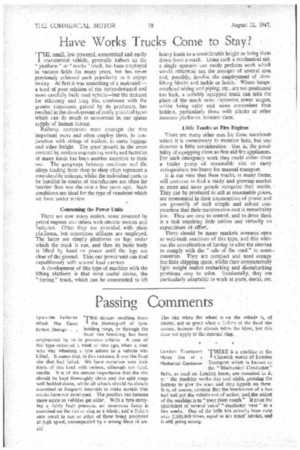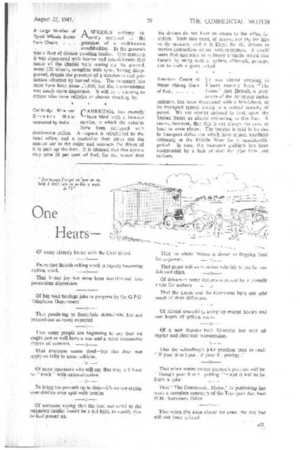Passing Comments
Page 24

Page 25

If you've noticed an error in this article please click here to report it so we can fix it.
JHE danger resulting from the blowing-off of tyreholding rings, or through the fixed rim breaking, has been emphasized by us in previous articles. A case of this type occurred a week or two ago, when a man who was wheeling a tyre across to a vehicle was killed. It seems that, in this instance, it was the fixed rim that had failed. We have ourselves seen incidents of this kind with serious, although not fatal, results. It is of the utmost importance that the rim should be kept thoroughly clean and the split rings well bedded down, whilst all wheels should be closely examined at frequent intervals to make certain that cracks have not developed. The position has become more acute as vehicles get older. With a tyre carrying a fairly high pressure, an enormous force is exercised on the rim or ring as a whole, and a failure may result in one or other of these being projected at high speed, accompanied by a strong blast of air.
Tyre-rim Failures Which May Cause Serious Damage .
The risk when the wheel is on the vehicle is, of course, not so great when a failure of the fixed rim occurs, because the chassis takes the blow, but this does not apply to the external ring.
London Transport THERE is a machine at the Makes Use of a L Chiswick works of London Mechanical Conductor Transport which is known as the "Mechanical Conductor." Bells, as used on London buses, are mounted in it, the machine works day and night, pressing the buttons to give the start and stop signals on them. It is, of course, obvious that the breakdown of a bus bell will put the vehicle out of action, and the object of the machine is to "treat them rough." It gives the equivalent of several years' "conductor wear" in a few weeks. One of the bells has actually been rung over 2,000,000 times, equal to ten years' service, and is still going strong. A Large Number of A SERIOUS robbery reTyred Wheels Stolen "cently occurred at the from Chassis . . . premises of a well-known coachbuilder. In the grounds was a fleet of chassis awaiting bodies. One morning it was discovered with horror and astonishment that many of the chassis were resting on the ground, some 120 wheels, complete with tyres, having disappeared, despite the presence of a watchman and protection afforded by barbed wire. The monetary loss must have been some £1,600. but the inconvenience was much more important. It will be a warning to others who have vehicles or chassis standing by.
Cambridge Hire. car ("AMBRIDGE has recently Drivers N o w '—'been blest with a hire-car instructed by Radio . service, in which the vehicles have been equipped with short-wave radios. A request is telephoned to the head office, and a controller then picks out the nearest car to the caller and instructs the driver of it to pick up the fare. It is claimed that this system may save 20 per cent. of fuel, for the reason that the drivers do not have to return to the office for orders. Such cars must, of course, not ply for hire as do taxicabs, and it is illegal for the drivers to receive instructions direct from customers. It would seem that operators of ordinary taxicabs would also benefit by using such a system, although, perhaps, not to such a great extent.
American Centre of I T was almost amusing to Motor Making Short learn recently from "The of Fuel. ... . . Times" that Detroit, a great centre of the American motor industry, has been threatened with a breakdown of its transport system owing to a critical scarcity of petrol. We are always inclined to look upon the United States as almost swimming in this fuel. It seems, however, that this is not always the case, at least in some places. The trouble is said to be due to transport difficulties which have caused unofficial rationing in the Middle West for a considerable period. In turn, the transport problem has been accentuated by a lack of steel for pipe lines and tankers.
















































































